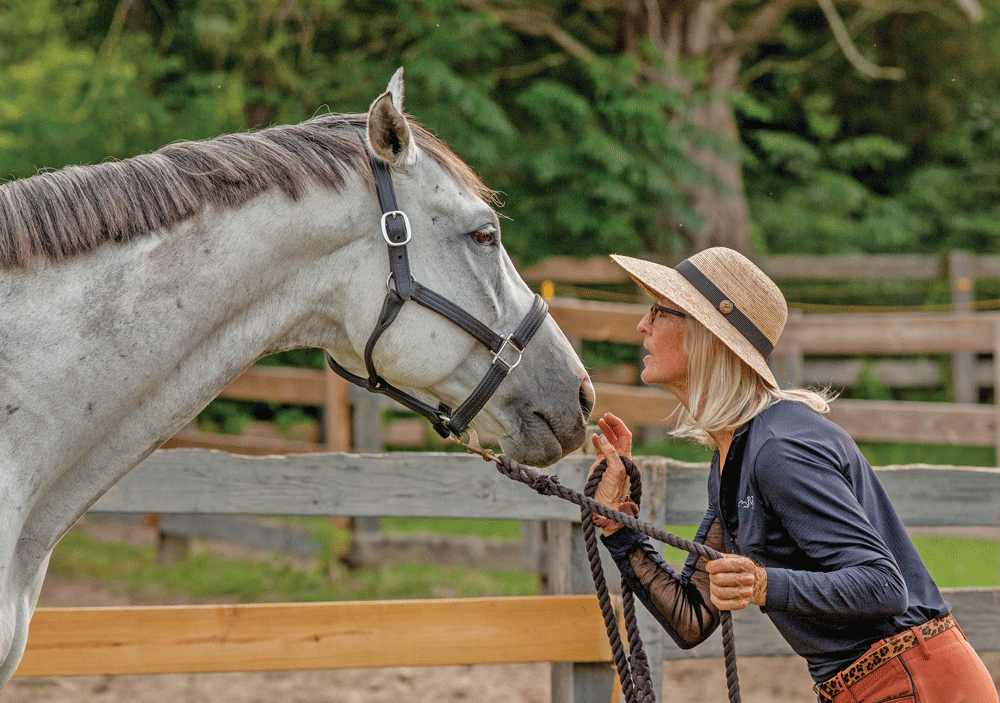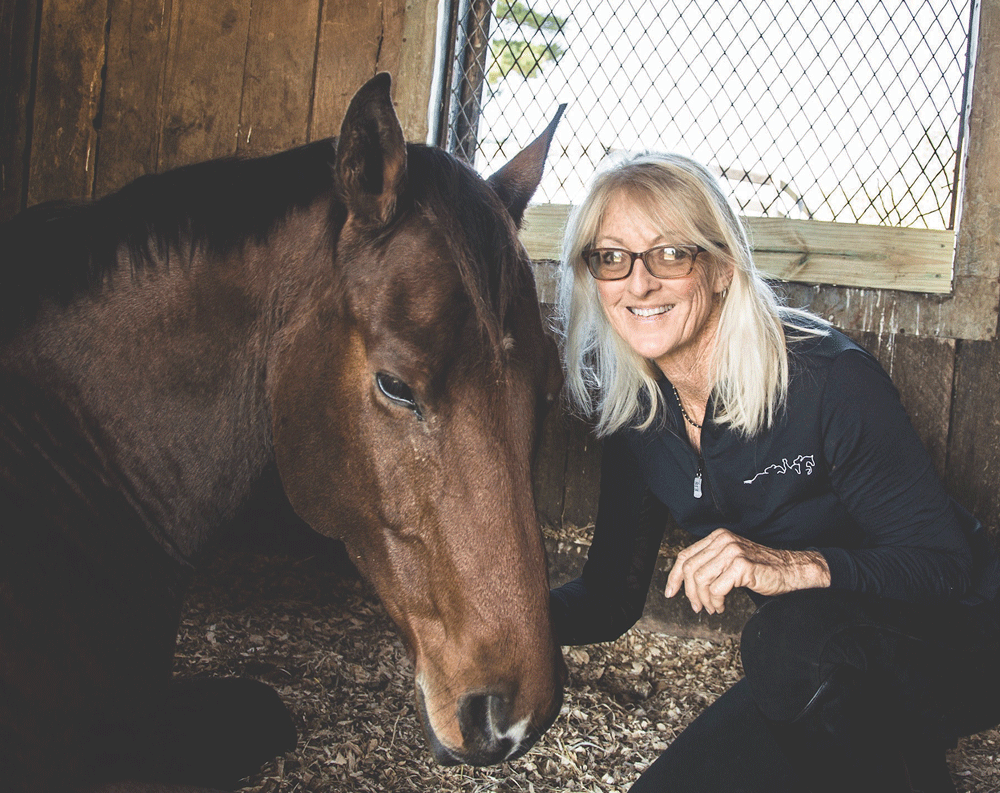Second Life for Off-track Thoroughbreds

By Heidi Baumstark
Everyone loves to win. And winners abound at Second Wind Thoroughbred Project, a non-profit in Marshall, Virginia that is breathing new life and purpose into off-track Thoroughbreds and to the people who love them.
Life-long horsewoman and transplant from Florida, Dayle Eldredge, is the founder and president of SWTP. She is on a mission to rehabilitate, retrain, and resell off-track Thoroughbreds-basically, to give them a “second wind”.
The idea is simple. When Thoroughbreds are ending their racing career, they have a whole life ahead of them and can begin a fresh start in eventing, fox hunting, or pleasure riding. Since 1985, Eldredge has been taking off-track Thoroughbreds and repurposing them, finding them new homes with caring owners. She’s been doing this mostly out-of-pocket for 35 years; but in 2014, unable to take in more horses on her own, she turned those efforts into creating the non-profit to broaden her vision and increase its scope. Eldredge leases part of a 130-acre farm in Marshall for her Second Wind organization that accommodates 15 horses.
Breeders, owners, trainers, and race-track riders are challenged to find an appropriate placement for horses whose careers at the track have ended. That is how aftercare programs like SWTP are helping. The goal is to make a difference in the needs of Thoroughbreds after life at the track, to promote these horses, educate the community, and increase demand for Thoroughbred ex-racehorses for second careers. This includes finding caring homes appropriate for each horse’s needs, whether that be retirement, pleasure riding, or competition.

(Above: Dayle Eldredge, creator of Second Wind Thoroughbred Project, with Van Lear Black (“Van”), a nine-year-old gelding. Courtesy photo of Second Wind Thoroughbred Project.)
Second Wind recently earned their distinction as an accredited aftercare program with the Thoroughbred Aftercare Alliance (TAA). “That was a lot of work and tons of paperwork to submit,” Eldredge said. “I work with an eight-member board who are committed to this mission. We are one of only three accredited programs in Virginia; that is a huge credential for us.”
Where do the horses come from? “We work with Aftercare Charles Town (ACT), a non-profit in Ranson, West Virginia,” she said. “They’re dedicated to repurposing retired racehorses that are ending their careers at Charles Town Races in Charles Town, West Virginia.”
Formed in 2013, ACT has helped place over 200 retired racehorses into new homes. Georgiana Pardo, vice president of ACT, said, “We find organizations we feel comfortable working with. In June, we placed two geldings with Second Wind, and in October, a mare was placed. Dayle then adopts them out and does her due diligence ensuring that wherever the horse is going, it will be a safe, good place.”
“The costs of getting retired racehorses into good second homes and careers vary, but can include shipping costs, vet bills, and stipends given by ACT to help organizations like Second Wind to properly restart the horses under saddle.” ACT is funded by fees paid by racehorse owners when their horses raced at Charles Town, and also by private donations.
“We don’t take possession or ownership of horses,” Pardo explained. Instead, ACT works with a handful of “placement partner” organizations that accept horses through ACT when they have available space. Each placement partner has been investigated by ACT’s board of directors and has demonstrated provision of proper care and rehabilitation. “We learned that Dayle was interested in becoming a placement partner with us. So, after touring Second Wind, we sent her two retired geldings in June: Cuckoo Charlie and Hillbilly Dancer,” added Pardo added.
“They have settled in well under Dayle’s care. Our board members were impressed by her feeding and caring program, horsemanship skills, and knowledge. Placement partners employ a variety of safeguards that distinguish them from horse-flippers or other for-profit enterprises.” Basically, lifetime horse safety is the priority.
In October, a third horse from ACT went to Second Wind. Her name is Denise of Cork, born in 2013, a West Virginia-bred mare that has raced 50 times. In 2020, she will be eligible to compete at the Retired Racehorse Project’s Thoroughbred Makeover in Kentucky. Eldredge added, “That’s been on my bucket list to have a horse from our program at the Makeover.” The Retired Racehorse Project is the creator of the Thoroughbred Makeover, which is the only national gathering of organizations, trainers, and farms that is showcasing the talent of retired racehorses.

(Above: Dayle Eldredge of Second Wind Thoroughbred Project with one of her horses at her farm in Marshall. Photo by Michaela Baumstark.)
Each horse has a story. Like a gelding named Canyon.
In October 2018, David Robinson of Pickens, South Carolina, adopted Canyon from Second Wind for his 14-year-old daughter, Caroline. “Dayle posted a video of him on her website and I showed it to Caroline,” said Robinson. “Canyon is so easy going; he doesn’t have a mean bone in his body. He’s being trained for dressage and won in two shows, in July and then in September. Dayle did a lot of work with him; if it wasn’t for Dayle we wouldn’t have found him.”
Eldredge said the Robinsons send her weekly photos of Canyon. “David always reassures me and says, ‘Don’t worry—he’ll have a forever home with us.’ Every horse I’ve placed, I know what they’re doing.” Most of the horses are now show horses and some are for pleasure riding.
Then, there’s Eldredge’s own story: “When I was 14, I got my first off-track Thoroughbred; his name was Admiral D.D. He was a difficult horse, and no one wanted to ride him. I’d sneak into his stall, feed and groom him. I decided to ride him. When I told my riding instructor, she couldn’t believe it since no one wanted to ride him. At that time, he was $700—a lot of money for me. I had to convince my parents, and my grandparents helped, too. I’ll always remember that horse.”
Eldredge has plans for the future. One is a program for veterans through the Wounded Warrior Project® that helps injured veterans and service members recover from physical or mental injury while serving in the military on or after September 11, 2001. “Our program is called Warrior And Horses United (WAHU),” Eldredge said. “Veterans can relate to horses retired from the racetrack; there are similar psychological issues. Veterans and horses help each other. This is in the formative stages, but I want to help these people and their families, and they love the horses.”
All this care takes time, resources, and people.
So, Second Wind is forming a fundraising committee. “Anyone interested in being on the committee, please contact me,” she said. Eldredge’s “wish list” includes donations for their winter hay fund, heavy turn-out blankets, dressage saddle, round pen, funds for emergency vet services, and volunteers to help feed horses, or someone who is computer savvy and can help with the website. “We have costs including a farrier, hay, and a really good feed program from Tri County Feeds in Marshall. We have an account with them;” Eldredge said. “Bill Jackson [of Tri County] is great and their customer service is the best.”
SWTP has a Horse Sponsorship Program (HSP), which is a fundraising initiative that helps support Second Wind for those who don’t want to or can’t own a horse; this program allows people to sponsor a horse
to cover basic care.
SWTP receives no public funding and relies totally on charitable, tax-deductible contributions. Pardo added, “These are wonderful horses that might be ending their racing careers when they’re five or six [years old]. They have an entire lifetime ahead of them to become a trusted partner for a variety of equestrian pursuits. Organizations like ACT and SWTP help ensure that transition is a smooth one.”
How did Eldredge come up with the name, “Second Wind”? She was at a friend’s house; over wine and conversation, her friend said she should start a non-profit to give these horses a “second wind.” That was it.
“Repurposing horses comes natural to me; in general, I love the whole idea,” Eldredge says. “People can place off-track Thoroughbreds in our program, others are looking to adopt a horse. Or others want to sponsor a horse that will remain at Second Wind until adoption.” Sounds like a win-win for everyone. ML
This article first appeared in the December 2019 issue of Middleburg Life.


